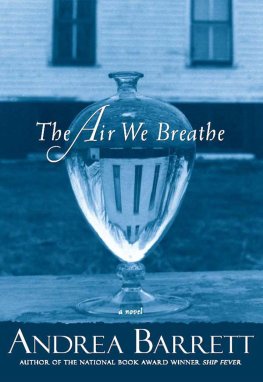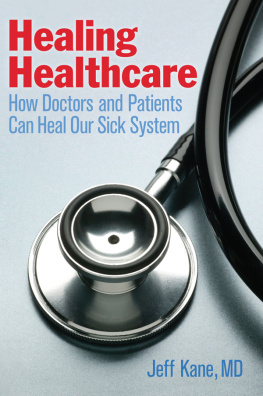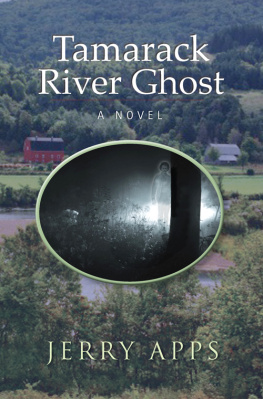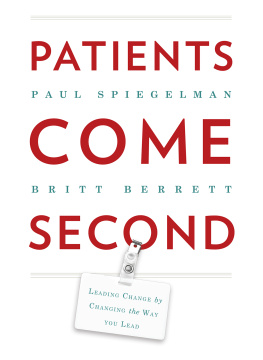Andrea Barrett
The Air We Breathe
Men are like plants; the goodness and flavour of the fruit proceeds from the peculiar soil and exposition in which they grow. We are nothing but what we derive from the air we breathe, the climate we inhabit, the government we obey, the system of religion we profess, and the nature of our employment. Here you will find but few crimes; these have acquired as yet no root among us.
J. Hector St. John de Crvecur, Letters from an American Farmer, Letter III, What Is an American? (1782)
In the first place, tuberculosis is largely a disease of the poor of those on or below the poverty line. We must further realize that there are two sorts of poor people not only those financially handicapped and so unable to control their environment, but those who are mentally and morally poor, and lack intelligence, will power, and self-control. The poor, from whatever cause, form a class whose environment is difficult to alter. And we must further realize that these patients are surrounded in their homes by people of their own kind their families and friends who are also poor. It is this fact which makes the task so difficult, and makes the prevention and cure of a preventable and curable disease a matter of utmost complexity.
Ellen N. LaMotte, The Tuberculosis Nurse: Her Functions and Qualifications (1915)
IMAGINE A HILL shaped like a dogs head, its nose pointed south and resting on crossed front paws. The main buildings of Tamarack State Sanatorium for the Treatment of Tuberculosis, including the two long brick wings where we used to cure, are set where the eyes would be. Theres a siding at the base of the hill four posts, a metal roof, space for a cart and the portable steps where the train makes a special stop and where, on arrival day, wed each looked up to see the sanatorium windows staring back at us. We all remember looking down for the first time, after getting settled in one of those wings, to see the new arrivals sagging down the steps or being passed on stretchers through the windows of the train.
Back then we lay on our porches in orderly rows, the two chairs assigned to each room still separated by shoulder-high panels and sheltered by canvas awnings. Fields surrounded us they still do and also a river, three ponds, and the road curving down toward the village. After the cities from which wed come, this looked to us like wilderness. Rivers, mountains, wild geese honking. The air meant to cure us pouring antiseptically through the woods. The Adirondacks were new to us, and we were shocked to learn that Canada was so near. The snow shocked us too, along with the dark winter days and the heavy mist that sometimes blanketed the fields. A fox, hunting, would brush his tail through the surface, leaving a track we followed with our eyes. Ducks escaping the fox would burst into the air as if theyd been shot. The sight made us think that our own lives, hidden similarly, might still be launched on their proper paths.
We werent a big group even then sixty women and sixty men, if every spot was taken and a single arrival shifted scores of relationships, as did a single discharge, or a death. On the porches we gossiped as eagerly as we drew breath. Twice each week, if the mist didnt block our view, the train pulled up to our unmarked siding and we inspected who might join us next.
IN LATE JULY OF 1916, the train from New York City brought us Leo Marburg. Tall, thin, with black hair worn too long and big hands with spatulate fingertips, he paused on the boarding steps until a porter passed him like a sack of wheat to the driver of our cart. The driver, without asking, draped Leo over the pallet in the back. Leo forced himself back up.
Im not that sick, he said. Up on the hill, our windows blinked at him. Let me sit beside you.
He eased himself down and around until, with the drivers grudging help, he was on the bench and looking out over the horses. The cart climbed from the siding and up the track, the buildings dotting the lower slope wavering slightly in the suffocating haze. Staff cottages, laundry, incinerator, power plant; he recognized only the stables, the others hed learn later. The mountains were cool, hed been told in the city, the air crisp and restorative. So what was this steamy batting wrapped around him?
Inside the door of our central building, Leo found it hotter still. The linoleum floor felt sticky; the hands of the nurse to whom the driver delivered him were hot and moist, and she treated him, Leo thought, like a bag of raw sugar being taken off a ship. Plop into a wheelchair, plop went his carpetbag into his lap; plop on top of the carpetbag went a pamphlet bound in olive paper: Rule Book, this said helpfully.
Read it, said the nurse.
Before he had time to glimpse more than a few of what seemed like hundreds of rules, she pointed out his Patient Number, inscribed in white ink on the booklets cover, and then a page where he was meant to sign his name. Above it was a statement saying hed read the rules and agreed to abide by them. I understand that I am occupying a bed badly needed for someone else, that I am fortunate to be here, and that only by obeying the rules conscientiously can I show my value to the community.
Sign, she said. Wed all been through this, and all, like Leo, had felt uniquely prosecuted.
She pushed a pen at him, prodded his hand, said Good when his hand obeyed her request, and then rolled him briskly down the corridor and into the lift that rose to the infirmary. What had he signed? As if to make up for his slowness, she recited rules as they whisked along. No talking, during his initial period of total bedrest. No smoking, no laughing, no singing, no reading, no writing. Do not get out of bed for any reason, bathroom privileges come later. Do not think gloomy thoughts. Eat whats put in front of you. Rest. Think only of resting.
How was this better than Brooklyn? When the lift opened he saw metal beds, in which lay long lumps not talking, not moving, not singing. Then he was inside a bathroom with a dark red floor. Toilets to one side, washbasins on the other. An adjoining room held a huge white tub, in which the nurse proceeded to boil him. That hed had a bath before getting on the train meant nothing to her: All new patients must be bathed on admission, she said firmly. This was a rule. So too was the astonishing temperature of the water, the disinfectant she poured in a copious stream, the harsh green soap with which she washed his hair. He tried not to wince as she scrubbed at his arms and back. Not to choke as she rested the heel of her hand on his head and gently, but quite firmly, pushed his head under the water.
Take a breath, she said, and then he was under, panic rising in him so swiftly that he could see, before it happened, his body bursting from the water, leaping upright, shaking off droplets like a dog. He stood there, naked and breathing heavily.
Thats not going to do us much good, she said calmly. I still have to rinse you off. But I can use a pitcher if youd prefer.
He squatted back down, squeezing shut his eyes while she poured water over his head. Count, he thought, as the acrid water streamed. OnetwothreefourfivesixsevenHe had always hated being underwater, but how could she have known that? When she was done she draped him in towels and inspected his bag, first pulling on white cotton gloves. Piece by piece she pincered out and laid on a metal table two pairs of flannel pajamas, a shabby woolen robe, a sweater, pants, a few shirts, underwear, books.
Why didnt you bring warmer clothes?
I packed exactly what the tuberculosis nurse in Brooklyn told me to, Leo said.
She shook her head and made a note on her clipboard. We keep telling them these are














